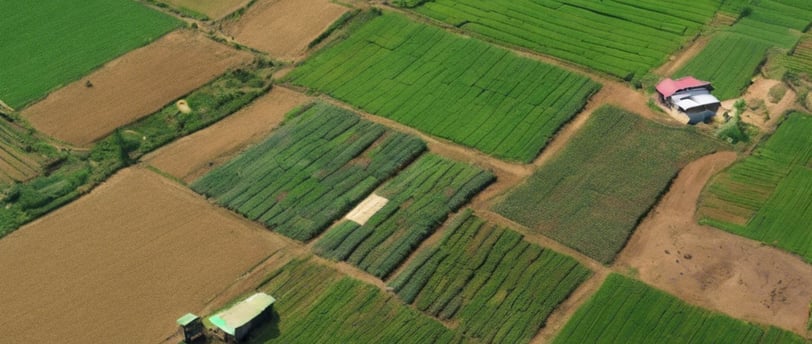Data-Driven Farming: The Future of Agriculture in Nepal with Agera
Agriculture has always been the backbone of Nepal’s economy, supporting the livelihoods of millions of smallholder farmers. However, traditional farming methods are no longer sufficient to meet the growing demands of food production, environmental sustainability, and climate adaptation. With Nepal’s agriculture sector facing numerous challenges—such as unpredictable weather patterns, inefficient resource use, and declining soil fertility—farmers are increasingly looking for innovative solutions. Data-driven farming is emerging as a game-changer, providing the tools and insights farmers need to revolutionize their operations.
SENSOR AND TECHNOLOGYAGRICULTURE PRACTICES
10/2/20244 min read


The Need for Data-Driven Farming in Nepal
Nepal’s farming landscape is highly diverse, but many farmers still rely on traditional knowledge and intuition to make critical decisions. While these methods have sustained communities for centuries, they often lead to inefficiencies in resource use, poor crop management, and vulnerability to climate change. For example, farmers may over-irrigate fields, depleting water resources, or apply fertilizers without understanding their soil’s nutrient needs, leading to waste and soil degradation. As a result, many farmers struggle to achieve high yields and consistent profits.
Moreover, the impact of climate change is becoming increasingly evident in Nepal, with erratic rainfall, rising temperatures, and frequent natural disasters affecting crop cycles and food security. In this context, the lack of access to accurate, timely data is a significant barrier to improving agricultural outcomes.
What is Data-Driven Farming?
Data-driven farming is the use of advanced technologies and real-time data to monitor, manage, and optimize agricultural activities. It transforms the way farmers approach key tasks such as irrigation, fertilization, planting, and pest control by providing actionable insights based on the specific conditions of each farm. Rather than relying on guesswork or traditional practices, farmers can now use precise data to tailor their strategies for better results.
In Nepal, where many farmers lack access to modern technologies, Agera’s sensor-based system is playing a pivotal role in driving this transformation.
Agera: Empowering Farmers with Real-Time Data
Agera’s system is designed to make precision agriculture accessible and affordable for farmers in Nepal. It collects real-time data from the field using a 7-in-1 sensor that monitors crucial parameters such as soil moisture, temperature, NPK (Nitrogen, Phosphorus, Potassium) levels, pH, and air humidity. This data is then transmitted to a cloud-based platform, where it is analyzed to generate insights that help farmers make informed decisions.
Farmers can access these insights through an easy-to-use web platform or mobile application, giving them the tools to:
Optimize irrigation schedules, reducing water waste and preventing over-irrigation.
Apply fertilizers more effectively, based on precise nutrient data.
Anticipate and manage pest and disease outbreaks by monitoring environmental conditions.
Adapt to changing weather patterns, enhancing climate resilience.
The Benefits of Data-Driven Farming for Nepal
Improved Resource Efficiency One of the primary benefits of data-driven farming is the ability to optimize the use of resources such as water, fertilizers, and pesticides. Agera’s real-time data allows farmers to water their crops only when necessary, apply fertilizers in the right quantities, and manage pests before they become a problem. This targeted approach not only reduces costs but also minimizes the environmental impact of farming.
Increased Yields By monitoring key soil and environmental conditions, data-driven farming enables farmers to create the ideal growing environment for their crops. With better irrigation, fertilization, and pest management, farmers can achieve higher yields and more consistent production. For smallholder farmers in Nepal, this can mean the difference between a successful harvest and a failed one.
Climate Resilience Climate change is one of the biggest threats to agriculture in Nepal, where unpredictable weather patterns and extreme events like floods and droughts are becoming more common. Data-driven farming equips farmers with the information they need to adapt their practices to changing conditions. Agera’s system, for example, can alert farmers to drought risks or temperature fluctuations, enabling them to take preventive measures such as adjusting irrigation or planting drought-resistant crop varieties.
Better Decision-Making Traditional farming often relies on intuition, seasonal patterns, and manual observation, which can lead to inaccurate or untimely decisions. Data-driven farming eliminates much of the guesswork, providing farmers with precise, real-time data that informs every aspect of their operations. This shift from reactive to proactive farming enables farmers to anticipate problems, optimize resource use, and improve their overall efficiency.
Sustainability Sustainable farming is becoming increasingly important in Nepal, where unsustainable practices like over-irrigation and excessive fertilizer use are leading to soil degradation and water scarcity. Data-driven farming encourages more efficient use of resources, reduces environmental harm, and promotes long-term sustainability. With Agera’s system, farmers can reduce their environmental footprint while increasing profitability.
Scaling Data-Driven Agriculture Across Nepal
Agera’s data-driven farming system is already being piloted in several regions of Nepal, where farmers are seeing the benefits of real-time monitoring and precision agriculture. However, the potential for scaling this technology is immense. With support from government bodies, NGOs, and research institutions, Agera aims to make its system available to more farmers, including those in remote and underserved areas.
By building partnerships with farmer cooperatives, extension services, and agricultural organizations, Agera can expand its reach and help transform farming across Nepal. This shift toward data-driven agriculture will not only improve food security and livelihoods for farmers but also contribute to the broader goal of achieving sustainable development in Nepal.
Conclusion: The Future of Farming is Data-Driven
As Nepal’s agriculture sector faces the twin challenges of climate change and resource scarcity, the adoption of data-driven farming systems like Agera offers a path to greater productivity, sustainability, and resilience. By leveraging real-time data, farmers can make smarter decisions, optimize their use of resources, and increase their yields, all while reducing their environmental impact.
Agera is leading the way in making data-driven farming accessible and practical for farmers in Nepal, ensuring that the future of agriculture is both sustainable and profitable. As more farmers embrace this technology, Nepal’s agricultural sector will be better equipped to meet the challenges of the 21st century.



